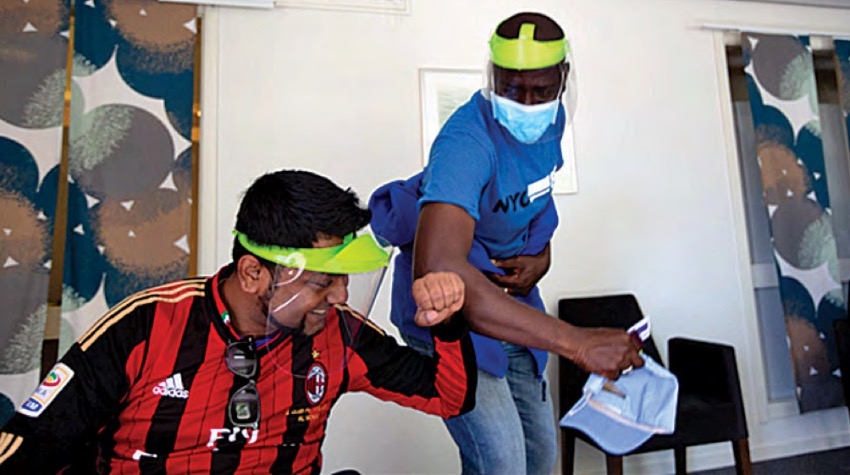No one is safe until everyone is safe
Ending the pandemic means also enabling access to COVID-19 vaccines for migrants.
While many countries around the world have adopted COVID-19 vaccinations strategies that are inclusive of migrants and refugees, significant obstacles remain in practice. Indeed, migrants face multiple barriers in accessing healthcare and other essential services. In the EU, several countries, including Germany, Belgium, and France, are expanding access to COVID-19 vaccines for migrants. However, information, outreach and language barriers; vaccine hesitancy due to fears of side effects; lack of documentation and complex registration processes; fears of arrest, detention or deportation; and limited vaccine supply mean that many are falling through the gaps.
To bridge these barriers and enable all migrants to benefit from COVID-19 vaccines, health services must be made accessible to everyone, irrespective of legal status, without fear of detention or deportation. The EU could play a bigger role in assisting Member States to make sure that their vaccination strategies are more inclusive in practice, including through funding and sharing of practices. Across the EU, National Red Cross Societies have been working hard to eliminate or ease these barriers and facilitate access to vaccines for vulnerable communities.

In Sweden for example, data from a healthcare referral clinic for undocumented migrants operated by the Swedish Red Cross revealed that 95% were not yet vaccinated, while 79% of them would like to receive the vaccine, and 40% were identified as high risk due to pre-existing health conditions. To assist migrants in an irregular situation to receive their vaccine, the Swedish Red Cross House in Stockholm, a shelter for vulnerable groups, invited the “Vaccine Bus” to offer vaccines to its visitors. The bus is a mobile service operated by the public authorities to reach out to people who are struggling to access the vaccine through the digital booking system. By coordinating with the public health provider, the Swedish Red Cross is facilitating COVID-19 vaccines for undocumented migrants, many of whom who face barriers due to a lack of digital identification and difficulties in reaching healthcare centres.
Similarly, the Belgian Red Cross (French speaking) has launched the “MobiVax” project in collaboration with Médecins du Monde, Médecins Sans Frontières, and SamuSocial. Through MobiVax, mobile teams travel to institutions and centres which host vulnerable communities, such as homelessness people and migrants, to vaccinate them with a single shot vaccine. As the people residing in these centres often come from precarious living conditions and lack the identification documents needed to be vaccinated at a vaccination centre or a doctor´s practice, MobiVax helps to ensure that the national vaccination campaign is as inclusive as possible of all people. The Belgian Red Cross (Flanders) is also implementing large-scale vaccinations for the residents of eighteen asylum reception centres, accompanied by an information campaign to counter misinformation. By providing objective, science-based information and working with psychosocial and medical staff, the campaign enables reception centre residents to make conscious decisions about whether to receive the vaccine or not. As a result, the average vaccination rate in the centers has risen to 70%.

Ever since the beginning of the pandemic, misinformation has been a significant obstacle to testing for, treating, and now also vaccinating against the virus. For migrants and refugees, additional challenges exist in accessing accurate information about where and how to get vaccinated, resulting in enhanced vaccine hesitancy. The Bulgarian Red Cross works to raise awareness by translating informative resources into the languages spoken by migrants, thereby increasing access to easy-to-understand information. The dissemination of these material is accompanied by Q&A sessions to eliminate any confusion or hesitancy, thus providing communities with practical guidance and relevant information to make informed decisions about vaccinations.
In many cases, migrants also face indirect or informal barriers which negatively impact their access to health services, including COVID-19 screening and vaccinations. Lack of national documentation, hesitancy due to fear of being detained or deported, digital difficulties, language barriers, and limited healthcare provision in transit contexts – factors which combine to form an “invisible wall” that impedes migrants from protection against the virus, and thus contributes to prolonging the pandemic. This context demonstrates the crucial importance of “firewalls’’ between healthcare providers and immigration authorities to help guarantee that migrants can access vaccination and related essential services, regardless from their status.
With nobody being safe until everyone is safe, the EU and Member States must increase efforts to translate policy into practice. Authorities should ensure that all migrants are included in national, and local COVID-19 contingency, prevention, and response plans – actions which ought to prioritise the most vulnerable, based on needs and levels of risk to COVID-19, not on migration or legal status. This requires removing formal and informal barriers so that all people can access preventive and curative healthcare. Where migrants rely on humanitarian organisations, the latter should be enabled in their efforts to provide assistance and address needs.
For information more information, please see the new Global Migration Lab report “Sight Unseen: A vision for effective access to COVID-19 vaccines for migrants”, powered by the Australian Red Cross.
Read our recommendations to the EU and Member States on Protecting the humanitarian space to access and support migrants.
For media inquiries, please contact Eva Oyón on: eva.oyon@redcross.eu or +32 2 235 09 22

